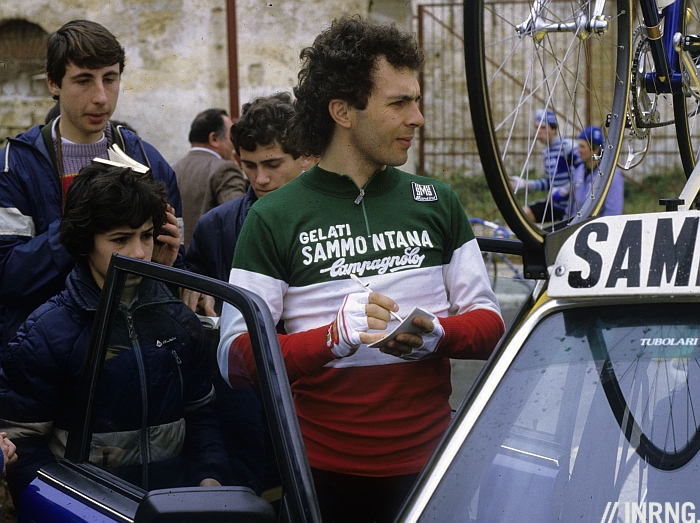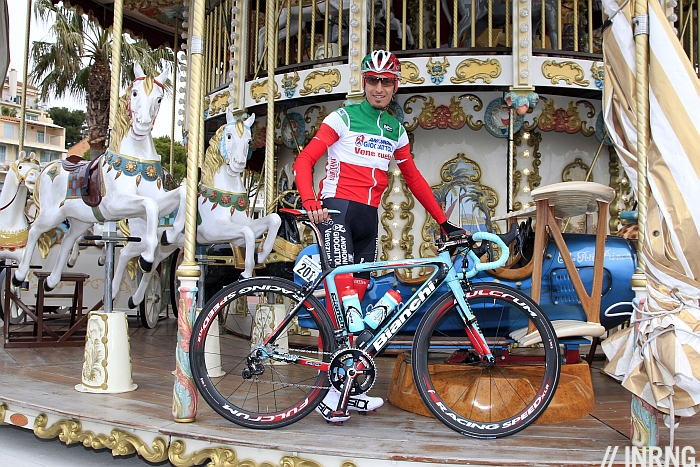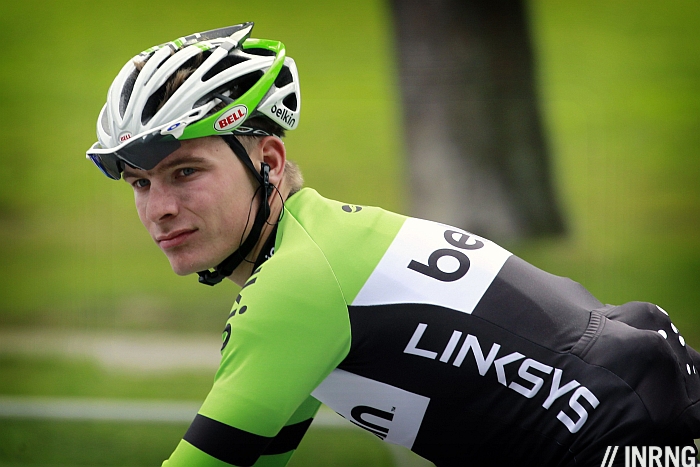Team Belkin won all nine stages of the Tour of Hainan with Moreno Hofland winning the overall. It’s an impressive feat to win all stages and the overall. Perhaps it’s been done before. Certainly the 1977 Vuelta a España saw Freddy Maertens winning 13 stages on his way to the overall and in 1984 Laurent Fignon won the Tour de France whilst his Renault-Elf team won 10 stages.
Away from the podium ceremony It’s also an interesting strategy for a World Tour team, they get publicity of course but also points in this Chinese race.
In times past teams have recruited riders with points earned in Asia but now Belkin went to Asia and won plenty of points.
Points Demand
At one point there were 17 teams chasing 18 places in the World Tour but Europcar are now the 18th team. It means there’s little need for teams to recruit riders with points right now. A year ago these points where valuable currency when squads were competing for promotion and relegation. It’s likely that points will soar value in 2014 given Fernando Alonso and Oleg Tinkov have plans to create new teams meaning the possibility of 20 teams chasing 18 places.
It’s more subtle as points held for two years and teams signing riders now will often recruit on a two year contract meaning their points will matter for qualification in 2015. But right now it explains in part why some riders in the UCI’s top 100 like Greg Bole and Simon Špilak have no contract for 2014 despite points to their name.

Famous Names in the Peloton
Back to Hainan and Moreno Hofland. If you think Moreno isn’t a very Dutch name, you’d be right. Instead he’s named after Moreno Argentin, the four time Liège–Bastogne–Liège winner. There are quite a few riders named after other cyclists, you’ll spot a few in Holland and Belgium. There’s also Europcar’s Giovanni Bernaudeau. The son of team owner Jean-René, he was named after Giovanni Battaglin after Bernaudeau had gone through an Italian phase including success in the Giro.
You might think OPQS’s Gianni Meersman was also named after a rider but it turns out he’s just named after a restaurant. “My parents were thinking about a name for me whilst they were eating in an Italian restaurant, which was called ‘Gianni'” he told website Daily Peloton.
No job for Horner?
Talking of old champions, it’s still astonishing that a grand tour winner can’t find a job for 2014. Perhaps Chris Horner has a contract but if he did then you’d think it would be worth boasting about before the media goes into hibernation? Which suggests he hasn’t got a ride.

Astana set to break MPCC rules
Horner’s problems include his age and worries about skeletons in USADA’s cupboard. But perhaps Astana could give him a job? After all they’ve signed Michele Scarponi for 2014 and now we’ve got news that Franco Pellizotti is joining too. Pellizotti is supposed to be blocked from joining the Kazakh team until May 2014 under the rules of the Movement for Credible Cycling, a self-regulating group of teams. But cyclingnews.com’s Stephen Farrand reports:
“Astana appears ready to try to bend the MPCC rules by signing a contract with Pellizotti that begins on January 1 and allowing him to wear the Astana jersey and attend training camps.”
Astana accept Pellizotti cannot race until May 2014, cyclingnews.com
This isn’t bending the rules, it’s breaking them. Here’s the MPCC’s Rule 2:
“Can’t hire, until two years, a rider tested positive and suspended more than six months”
Note the word hire which also appears in the French rules, engager. It’s not about racing, any recruitment that is specified.
MPCC Rules
The MPCC rules are clear in this case but the rules need a redraft. The text is clunky. Take Pellizotti who can swim through another loophole. In French Rule 2 says you can’t hire a rider involved in doping affairs that have got a ban of more than six months but in English it says a team can’t hire “a rider tested positive and suspended more than six months”. Spot the difference? One says doping affairs and the other says tested positive and these are subtly different. In French any doping case is involved but in English only positive tests are cited, surely a mistake given riders can be sanctioned without testing positive, for example Pellizotti was caught by the bio-passport.
Court of Arbitration for Sport
Perhaps such loopholes could be tested at the Swiss-based Court of Arbitration for Sport. The CAS is a useful institution to resolve sporting conflicts without clogging up the courts. Did you know cycling is second to soccer as the biggest user of the CAS? You do now.
But justice needs to be seen to be done and the CAS website seems to be full of missing rulings. The ruling that let Katusha back in the World Tour earlier this year has been pulled down after it contained some typos but it never went back up. More recently El Pais has reported Bjarne Riis won a case against the UCI over its ban on riders returning from doping scandals to earn sporting value points for the the team. But there’s nothing online.
Riis vs UCI
If Riis has won the case it’s a small victory for anti-doping. The UCI’s rule – never made public – said that a rider returning from a doping ban could not earn sporting value points for their team when it came to counting rider points to rank teams for their licence applications. This blog first pointed out the rule could not stand back in 2012.
At first glance this extra punishment looks good but the UCI was going beyond the WADA Code’s provisions with longer punishments than a ban. By winning the case Riis has done his bit to strengthen WADA’s position as the ultimate anti-doping agency rather than letting different sports make up different rules.
French Football Tax Strike
Having covered the topic of tax and why it’s a handicap for French teams the other day, I’ve had a couple of emails asking about the new 75% applied to football and whether it’ll hit French teams. To explain, French President François Hollande had a campaign pledge to introduce a new top rate of income tax at 75% but he’s struggled to implement it. Instead the tax now falls on employers who pay very high salaries and this means football clubs have to pay for their stellar wage bills but it applies to all businesses. It’s annoyed the French clubs who have called a strike and won’t play certain games.
Only no French pro cycling team need worry because no French cyclists are paid enough to become liable. It could be an issue in the future if one of today’s golden generation achieves the alchemy of turning promise into results but should this happen the rider will probably sign for a foreign team anyway, just as most of France’s best footballers play in foreign leagues.


“If Riis has won the case it’s a small victory for anti-doping.” […] “By winning the case Riis has done his bit to strengthen WADA’s position as the ultimate anti-doping agency rather than letting different sports make up different rules.”
Hold on, by your reasoning abolishing the entire MPCC would also be considered a victory for anti-doping since it essentially does the same thing: enforcing additional rules that WADA has not layed out.
Please elaborate.
That was quick, I wondered if someone would pick this up. For the difference is the MPCC is a voluntary self-regulating club. If Astana don’t like it they can leave tomorrow and without much fuss. It’s only when you come to enforceable rules set by the likes of the UCI and governing bodies that you need consistency.
Related news on consistency between sports etc – Frederic Donze, director of WADA’s European office, spoke yesterday at the Play The Game conference – and addressed/queried whether amnesties are the best way forward:
“I think the difficulty about an amnesty is that if you do it, what about other athletes that has been sanctioned in other sports?…. If a basketball player is sanctioned for doping and see that a doped bike rider has benefitted from an amnesty, I think the concept of harmonization and fairness is a bit lost.”
from http://ptg2013.mediajungle.dk/2013/10/29/amnesty-is-not-the-answer-to-fight-doping-in-cycling/
Interesting that Donze said that, especially given that there’s little “harmonization and fairness” now across sport in terms of frequency of testing, what is tested for, strictness of enforcing rules, etc. Maybe he’s hoping to bring all the ships around to the same course over the next 10 years, but his idea seems a little off base at the moment.
The 1980 TdF was won overall by Joop Zoetemelk. His TI Raleigh team won 11 stages that year (those where the days…).
About the 75 % tax, it’s supposed to apply on incomes above 1 M€, all incomes below that remain taxed at the usual rate.
Also, employers get to pay it because most footballers (I don’t know about cyclists in this case) have negotiated a net salary, resulting in the employers paying, directly or not, in every case.
“no French cyclists are paid enough to become liable”
I would suggest that very few cyclists anywhere would be liable – you could probably count them on your fingers.
Shows the difference between football and everyone else!
Not quite so, it is rather a question of sports popular in France. The list of world’s highest paid sportsmen is headed by golf, tennis, basketball and american football stars. The soccer ones are at the end of top 10; btw. F1 Alonso (30 M€) enters top 20. One needs the income 16 M€ (salary plus endorsment), thus by far no cyclist in top 100 from Forbes. Maybe top 1000?
There are definitely more than 10 riders earning over a million a year. It’s hard to put a number on it but fewer than 20.
Fingers and Toes then!!
Are we counting $$ from endorsements? LA was a rich guy on and off the bike!
Even if we factor out the Livestrong component.
I remember Subaru commercials in the US for years with LA.
I wonder how fans would react today if Team X were to win more than half of the stages in a GT & the overall?
Meltdown…
I wouldn’t wonder, if Team X were the only Pro Team amongst third league and below teams. Like Belkin in Hainan,
Agree – but Chuffy was specifiying a GT scenario
My favourite named-after-cyclist current pro has to be Winner Andrew Anacona. Comment section here: http://inrng.com/2013/03/the-future-from-2010/
INRNG, just re-read your post linked http://inrng.com/2011/09/ag2r-sohrabi-points-fishing/
Tabriz Petrochemical…yes, well, with what we know now…interesting reading against the background of the last 2 years…
Mille Grazie for the great photo of young Argentin in the tricolore! The wheel and hub of the bike on the car caught my eye first as I scrolled down. Those were the days!
MPCC is a joke, nothing more. They may as well call it the MCDSWB “Movement to Cover Doping Scandals With Bull__it” for all the credibility it has demonstrated.
Yeah those were the days. Notice the alloy toeclips on the Campy SR pedals? Are those Binda extra straps! Try and find a pair of them new today! rare as hens teeth
Here’s a link to the Riis report: http://www.tas-cas.org/d2wfiles/document/7149/5048/0/Award20305520FINAL20_internet_.pdf
Thanks. I get the rulings by email but this one dropped out and it’s not on the French part of the website either.
The UCI had their heart in the right place with this but in trying to add to the penalties, they were acting outside the WADA Code.
I got a link on twitter last week and read through it, I had to go back through my history to find it. Maybe it’s not yet signed off for publication on their site, or they’re slow in updating.
Little Jack Horner
Sat in a corner
Eating his Christmas Pie
……….
Looks like MPCC, have approved the signing now anyway…http://m.cyclingnews.com/news/mpcc-approves-pellizottis-move-to-astana
Yes, and nice to see the point about the wording being taken up with Legeay/MPCC. The rules need to be clear and not open to interpretation.
Whoever convinced Pellizotti to pose for a photo on a merry-go-round is a genius
With this difference between the English translation of the French document. Do they not have in the mouseprint some sort of caveat that the rules are written in one language, that holds precedence, and that everything else is a mere translation? All legal matters are then resolved in the original language of the rules and regulations.
The whole thing looks like it needs a lawyer and a translate to spend an afternoon fixing it. It’s good the MPCC has a website now but this exposes the less than watertight wording. As I say these rules need to be firm and not open for people to second-guess and interpret.
Never seen much about the mechanism for sporting disputes needing referral / reconciliation via CAS . How does a team or rider engage them in his complaint ? are the guideline s / rules the same for all sportsmen and sportswoman irrespective of nationality and sport they operate in ?
As arbitration both sides agree to go and stand by the result. In some cases the CAS is cited as the default body for appeals. There are mechanisms to go beyond the CAS, eg to appeal the verdict under Swiss law but this is exceptional and the complaint has to prove the CAS was at fault, eg a panelist did not declare a conflict of interest etc.
Thanks sir , appreciated
So where the arbitration option is denied by a one party then CAS cannot sit – the problem then would be legal action is also disallowed by sports eg football is such a case .
That’s a problem in many cases I’d figure
The CAS decision on Marcel Kittel and UV blood therapy is also missing, as far as I can tell. The Riis decision however seems to be there now.